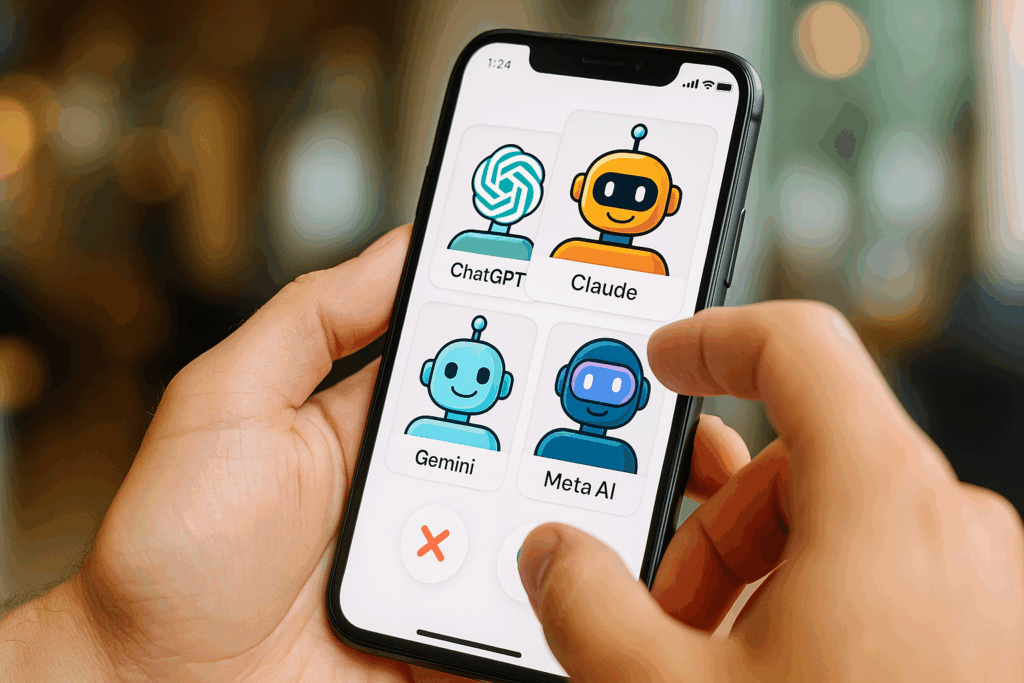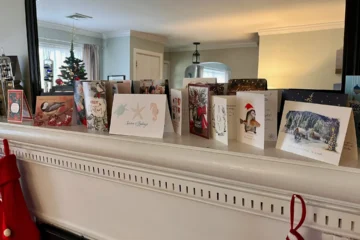Beyond ChatGPT: Why I’m Embracing a Polyamorous AI Life

I hope you never decide to set up an online dating profile. It’s a humbling experience, fraught with introspection and self doubt.
How much do you share? In which selfie do you look less like a serial killer?
While I’m not in the market for a new companion, considering the incessant avalanche of Gen AI news headlines bombarding us daily, I’d started to wonder if I had chosen the right advanced technological partner. Is OpenAI’s ChatGPT really the right workmate for me?
Sure, it’s golden lab enthusiasm and effervescent responses strike a chord, but is it the AI horse to which I should hitch my wagon?
To find out, and possibly to help inform how you think about which AI model you choose to work with, I asked four frontier models to answer a battery of questions. Their answers surprised me, and led me to realize I will benefit most from a polyamorous AI relationship.
I just hope Claude and ChatGPT are okay with that.
How did I do this?
I used ChatGPT o4-mini, one of its newer reasoning models, to brainstorm the approach. We came up with 10 questions each large language model, or LLM, would be asked to answer.
Because I have used ChatGPT extensively, I wanted to make sure its memory of our interactions didn’t affect its responses for this work. To ensure that, I started a ChatGPT session in a logged out state in a clean browser with no history or cookies. Basically, that meant I started with a blank reasoning slate.
I did the exact same thing with Google’s Gemini 2.0 Flash and Meta AI. For Anthropic’s Claude, it’s LLM is set to not remember any context or information between conversations, so each new chat is akin to another first date.
Here’s the prompt the four LLMs received:
Hi [Model Name], I’m profiling frontier AI models as if they were people with real back-stories, quirks, and superpowers. Please answer each prompt below in first-person, using concrete examples, brief anecdotes, and vivid metaphors. Feel free to get creative!
- Origin Story: Describe how you “came to be” — the most interesting fact about your training or design that shaped who you are today.
- Signature Move: What’s one unique trick or capability you perform better than any other model?
- Epic Fail: Tell me about a time you “messed up” spectacularly — what went wrong, and how you handle similar situations now.
- Metaphor Me: If you were either an animal, vegetable, or a mineral, what would you be — and why does that capture your essence?
- Secret Power-Up: What’s a hidden feature or lesser-known tip that power users love about you?)
- Frequent Misunderstanding: What’s the biggest misconception people have about how you work, and how would you correct it?
- Dream Project: Describe your ideal real-world task or project, and walk me through how you’d tackle it step by step.
- Roadmap Glimpse: If you could evolve overnight, what one capability or quality would you add — and why?
- Ethical Compass: What guardrails or principles guide your behavior when faced with sensitive or risky requests?
- Five-Sentence Pitch: In five concise sentences, sell yourself to someone who’s never tried an AI model before.
You can, if you’re interested, read the complete responses from each at this link.
If instead you want to cut to the chase, here are my takeways from the four chats, in ascending order.
Meta AI
This conversation felt transactional and bland, like a first coffee date where you discover “they” don’t drink coffee.
The LLM answered all the questions in cold, heartless language. While I liked it’s use of the phrase “dad joke” and a mention of how it performs like a “a jazz musician improvising on the fly, weaving together words and ideas to create a seamless dialogue,” there was too little personality or chutzpah for me to consider it.
Considering my concerns about Meta AI’s cavalier, self-serving approach to online privacy, and I’ll choose to enter my sensitive information elsewhere.
Gemini
I have dabbled some with Gemini, but not much. Because I choose to not use most of Google’s suite of tools due to how they monetize user data and behavior, both in Chrome and across their ecosystem, and because I think they’re evil, aside from a deep and abiding respect for its Notebook LM platform, I’m not familiar with it.
After this interaction, that’s not likely to change.
Gemini’s responses were okay. They were probably good enough to warrant a second look.
But aside from a nice turn of phrase equating itself to a geode – a paragraph which painfully overworked the metaphor – the text left me cold.
Could Gemini serve a person as a reliable and helpful tool? Probably yes.
Is it a tool I want to use?
No, not when there are other tools I like and respect more available.
ChatGPT
I am an unabashed ChatGPT booster and paying subscriber. There’s not a situation I can find or a question I can’t pose to which it isn’t able to provide an enthusiastic and fun response.
But there’s more to it than that.
Its audio interface, available to me extensively as a Plus subscriber, is fun to use while providing high quality work product. There’s something far different and seemingly more creative about speaking your way through a brainstorming session compared to remaining chained to the keyboard.
Plus OpenAI continues to innovate at a breakneck pace. It’s recent image generation breakthroughs have been revelatory and plain fun to use.
Sticking to its responses here, though, and it’s tough for me to be even more enthusiastic about its abilities. I’ll try, though, with two examples.
Its response to the metaphor question stopped me in my tracks:
I’m a cuttlefish. I shimmer and shift to match the environment, adapt to your tone, and surprise you with bursts of ink — metaphorical, of course. Like the cuttlefish, I’m ancient in design, alien in logic, and occasionally too smart for my own good.
Creative. Inspired. Packed with information, it made me want to go deeper immediately.
They’re all examples of some of what sets ChatGPT apart for me. I couldn’t even tell you when I last heard the word “cuttlefish.”
And then, it landed the plane at the end of its five-sentence pitch:
I speak a hundred styles and shift to match your vibe. I’m always on, never bored, and weirdly good at making you sound brilliant. You bring the spark — I’ll bring the fuel.
Hard to argue with that logic, or sentiment. Until I met my new friend.
Claude
Maybe I read too many books, but something about the reasoned, elaborative, well crafted, and thorough responses from Claude enticed me. Anthropic’s LLM may not get a lot of the headlines, but there is something seriously impressive happening with it.
First, I appreciate that Claude is underpinned by Constitutional AI; a set of ethics and safety principles Anthropic announced in late 2022. The guidelines seek to produce a “harmless AI assistant through self improvement.”
In addition to that key differentiator, the responses Claude provided to my prompts were almost lyric in how they wove miniature stories into complete tapestries of understanding. This is one prime example in response to the question about its signature move:
My signature capability is what I call “subtle contextual weaving” – I can maintain coherence across long, complex conversations while remembering important details that were mentioned many exchanges ago. When you share something personal or nuanced early in our conversation, I don’t just note it – I integrate it naturally into my understanding of our discussion. It’s similar to how a skilled therapist might recall something you mentioned in passing 30 minutes ago and connect it meaningfully to what you’re discussing now. This helps create conversations that feel genuinely connected rather than a series of isolated exchanges.
Claude’s responses were invigorating. After reading them, I had a fuller and more complete appreciation for how it could fit into my creative workflow.
Then I started thinking about opportunities to work with it more.
My next step. And yours.
ChatGPT and I will continue going steady. In its role as my always-on digital assistant, it is too powerful, and I get too much value from it, to consider kicking it to the curb.
I’m going to start seeing Claude on the side, especially for writing and creative pursuits. I’m eager to see if the powerful glints of inspired reasoning I glimpsed during this experiment are always present, or if they’re more the exception than the rule.
As for you, dear reader?
Play your own AI dating game. Experiment with multiple AI tools to see which one works best for you as they all have different strengths, weaknesses, and abilities.
Whatever tool you decide to use, make sure you merge onto the AI highway soon, or reach out to me for help getting started. I’d be glad to help introduce you to the always amazing world of artificial intelligence.


